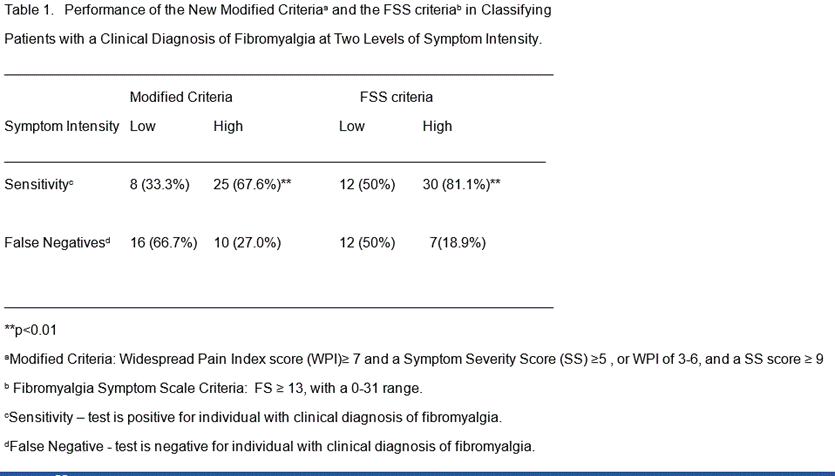Session Information
Date: Sunday, November 8, 2015
Title: Fibromyalgia, Soft Tissue Disorders, Regional and Specific Clinical Pain Syndromes Poster I
Session Type: ACR Poster Session A
Session Time: 9:00AM-11:00AM
Background/Purpose: In 2010, new criteria for fibromyalgia were proposed. In 2011, the questionnaire was adjusted so that patients provided the necessary information to satisfy the following criteria: Widespread Pain Index score (WPI) ≥ 7 and a Symptom Severity Score (SS) ≥5, or WPI of 3 to 6, and an SS score ≥ 9. In addition, a 0-31 Fibromyalgia Symptom Scale (FS) was developed by adding the 19 items of the WPI to the 12 items of the SS scale. Fibromyalgia symptoms wax and wane. The purpose of this study is to determine if the level of disease activity needs to be taken into account, when applying the new criterion sets in survey research.
Methods: The original questionnaire contained two scales; in one, patients record areas of pain and tenderness on a 19 point pain drawing; in the second, patients describe symptom severity on a 12 point range. The survey questionnaire (SQ) simplified the clinician somatic symptom report, by reducing it to yes-no answers to 3 symptoms (Lower abdominal discomfort, depression and headaches). Disease activity was measured on a 4 point scale ranging from usual symptom status to Symptoms severely intensified. The SQ was administered to 61 randomly selected women with a clinical diagnosis of fibromyalgia (FMS).
Results: The mean age of the FMS sample was 50.7±14.0 years with 15.2±2.2 years of education. The modified criteria were satisfied by 54.1% of the women who carried a clinical diagnosis of fibromyalgia. The FSS scale using a threshold score ≥ 13 was satisfied by 68.9% of the same women. For further analytical purposes, disease activity was collapsed into two categories; low and high disease activity. Performance of the modified criteria and FSS scale when disease activity is taken into account is shown in Table 1. As can be seen, sensitivity of both measures improved by over 30% when disease activity was high (67.6% versus 33.3%-modified measure; 81.1% versus 50.0%- FS scale).
Conclusion: Symptom variability is a problem for the new criterion sets for fibromyalgia and needs to be taken into account. People will engage in survey research at different levels of disease activity and are considerable more likely to satisfy the new criteria in periods or symptom exacerbation, often referred to as flare-ups. Taking symptom intensity into account is likely to generate more homogenous groupings within the fibromyalgia spectrum. In the low disease activity state, many patients are likely to function below the level of the new criteria.
To cite this abstract in AMA style:
Katz RS, Leavitt F. Performance of the New Survey Criteria for Fibromyalgia Under Conditions of Low and High Symptom Activity [abstract]. Arthritis Rheumatol. 2015; 67 (suppl 10). https://acrabstracts.org/abstract/performance-of-the-new-survey-criteria-for-fibromyalgia-under-conditions-of-low-and-high-symptom-activity/. Accessed .« Back to 2015 ACR/ARHP Annual Meeting
ACR Meeting Abstracts - https://acrabstracts.org/abstract/performance-of-the-new-survey-criteria-for-fibromyalgia-under-conditions-of-low-and-high-symptom-activity/

